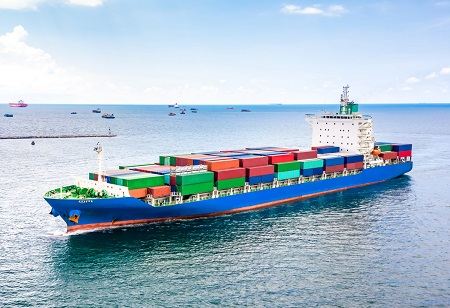
Back in the ancient world, the search for a low-cost way to facilitate trade and commerce resulted in the discovery & invention of various massive pieces of equipment such as ships, airplanes, and lorries. Thanks to them as goods and services can now be transported from one location to another by ship, air, or road, depending on factors such as geographical location, transportation costs, and value, whichever determines the actual mode. However, among all these three options, the shipping industry is the world's most preferred mode of transportation today. According to sources, shipping transports 90% of the world's 10.702 billion metric tonnes of international trade. The maritime industry is equally important for global trade and transportation. As a result, ship maintenance becomes extremely crucial for ensuring smooth and efficient operations. Proper maintenance not only extends the lifespan and performance of vessels but also ensures the safety of crew members and cargo. Let us deep dive& understand the difficulties that come in between maintaining a ship and doing business with it.
Fouling & Corrosion
Corrosion and fouling are two of the most common problems faced during ship maintenance. Ships are constantly in fight with the corrosive effects of saltwater, and fouling occurs when marine organisms attach and accumulate on the hull. Both issues can result in increased fuel consumption, decreased speed, and increased maintenance costs. Regular hull inspections and coatings are required to combat corrosion and fouling. Investing in high-quality anti-fouling paints and implementing advanced cathodic protection systems can help to mitigate these issues significantly.
Environmental Pollution Caused by Mechanical System Failure on Ships
Extreme stress and operational demands are placed on shipboard machinery. Mechanical equipment failures can result in both costly downtime and potential safety hazards. Proactive maintenance is required to address this issue. Putting in place condition monitoring systems can help identify potential problems before they become failures. Lubrication and alignment checks are required on a regular basis to ensure that machinery runs smoothly and reliably. As public concern about the environment has grown, the maritime industry has also subjected to stringent regulations aimed at reducing emissions and ensuring environment friendly practices. Compliance with these constantly changing regulations is challenging for ship owners and operators. Investment in environmentally friendly technologies such as exhaust gas cleaning systems, ballast water treatment systems, and energy-efficient propulsion systems can help meet environmental standards. Additionally, educating crew members on sustainable practices and efficient energy management can assist them in meeting compliance requirements.
Costly Breakdowns
Ship owners may face significant financial difficulties when it comes to ship maintenance. It is a very delicate project to handle towards maintaining a balance protection costs while ensuring the dependability and safety of the vessel. To overcome this task, ship owners should take a proactive approach to maintenance. Data analytics and sensor generation enable predictive renovation, which can help optimize security schedules, reduce downtime, and save you money on costly breakdowns. However, encouraging a cost-conscious lifestyle and involving group members in determining potential cost-cutting measures can significantly contribute to effective value management.
Crew Training & Competency
The maritime industry relies heavily on skilled team members to efficiently maintain and perform ships. Crew education and competency maintenance, on the other hand, present difficulties due to a variety of factors such as common team rotations, language barriers, and access to first-rate training facilities. Ship owners and operators should invest in crew training programmes that focus on exceptional delivery practices, safety protocols, and the use of new technology. Working with official maritime training institutions can ensure that team members receive the expertise and competencies they need to successfully carry out their responsibilities.
Spare Parts Availability
Obtaining spare parts in remote locations or during emergencies can be a daunting task for ship protection. A lack of spare parts can result in extended downtime, disrupting transportation schedules and revenue. To address this issue, ship owners must form strategic alliances with dependable suppliers and keep an updated stock of critical spare components on hand. In addition to, investigating virtual stock management solutions can help to streamline the procurement system and improve spare component availability.
Dry Dock Planning
Dry docking is a significant aspect of ship renovation, making an allowance for inspections, upkeep, and overhauls that can't be executed even as the vessel is afloat. However, scheduling dry dock intervals may be difficult due to restricted availability, high fees, and accelerated opposition for dry dock centers. Effective planning is vital to optimize dry dock schedules and minimize vessel downtime. Collaborating with shipyards well earlier, the use of statistics-pushed choice-making for scheduling, and considering bendy maintenance alternatives can help triumph over dry dock scheduling demanding situations.
Ship renovation is a complex and multifaceted process that necessitates constant attention to detail and proactive measures. By addressing demanding situations inclusive of corrosion and fouling, mechanical system screw ups, compliance with environmental policies, value control, crew training, spare parts availability, and dry dock scheduling, the maritime industry can decorate operational efficiency, expand vessel lifespan, and ensure more secure voyages. Even though there are numerous advantages to implementing emerging technologies in the shipbuilding industry, the challenges that arise must be addressed. As a result, it is crucial to embrace technological advancements, invest in team training, and foster a proactive maintenance culture to pave the way for a thriving and sustainable maritime enterprise in the face of these challenging circumstances.
We use cookies to ensure you get the best experience on our website. Read more...